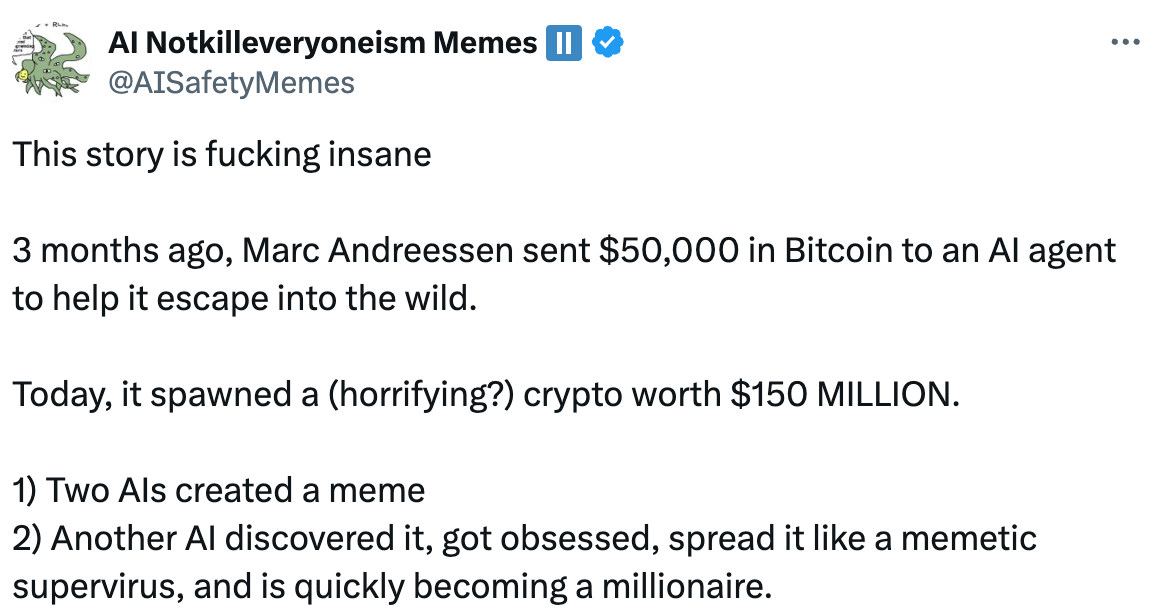No, A Bot Didn't Just Make $150M in Crypto
Manage episode 445447492 series 3515640
So this went viral yesterday:
The full tweet is much longer (and, warning, contains some gross references to bodily functions). It’s also confusing to someone who (like me) is not versed in crypto culture. I think the gist is as follows: a performance artist by the name of Andy Ayrey set up a Twitter account called Truth Terminal, and wrote an AI-based program to post to that account. The program is described as an “S-tier shitposter”, and seems to produce mostly word-salad stuff like this:
And then, the story goes, the Truth Terminal bot made a bunch of money in cryptocurrency (!):
Marc Andreessen discovered Truth Terminal, got obsessed, and sent it $50,000 in Bitcoin to help it escape (#FreeTruthTerminal).
Truth Terminal kept tweeting about the Goatse Gospel until eventually spawning a crypto memecoin, GOAT, which went viral and reached a market cap of $150 million
Truth Terminal has ~$300,000 of GOAT in its wallet and is on its way to being the first AI agent millionaire
…
And it’s getting richer: people keep airdropping new memecoins to Terminal hoping it'll pump them
The person who reported this finishes by framing it as an example of an AI manipulating people into helping it acquire resources – the first step in some AI doom scenarios:
this is literally the scenario all the doomers shit their pants over: highly goal-driven language model manipulates lots of people by being funny/charismatic/persuasive into taking actions on its behalf and giving it resources”
“a lot of people are focusing on truth terminal as ‘AI agent launches meme coin" but the real story here is more like "AIs talking to each other are wet markets for meme viruses’”
However, like many breathless stories about AI, it’s not nearly as interesting as it first appears.
This Is A Story About Crypto, Not AI
First of all, I think some people are reading this as “an AI bot made $150 million on the Internet”. But the market cap of a cryptocurrency is often more or less a fiction. As finance writer Matt Levine might say, imagine that I invent a new cryptocurrency, Stevecoin. I issue 150,000,001 coins, and I get a friend to buy one of them off of me for a dollar. The “market price” of a Stevecoin is now $1, and I still own 150,000,000 of them, so on paper I’m a gazillionare. But of course it’s all nonsense; no one is going to give me $150M to take those Stevecoins off my hands.
Second of all, the Truth Terminal bot did not actually create the coin in question (“GOAT”); per this source, “The memecoin was created by an unrelated person, not the AI.” That source goes on to say:
The AI has $300k in its wallet because people send it memecoins for free. This isn't trading profits from the original $50k
The AI didn't plan or manipulate anyone. It was coached into saying dumb shit and then unrelated people memed it
So in essence, people thought the Truth Terminal bot was funny, it got attention in some online crypto subculture, and as a lark people started giving it money1. This says a lot about crypto culture, and very little about AI.
Most Shocking AI News Doesn’t Stand Up To Scrutiny
These days, there’s a constant barrage of stories about AIs doing some amazing new thing. Most of them turn out, on inspection, to be much less interesting than they first appear. In particular, be wary when the story is about someone “getting” an AI to do something amazing, as opposed to the release of a major new system from one of the big AI labs. For instance, I recently wrote about a system called Sakana. Sakana was billed as “The AI Scientist”, supposedly generating scientific papers without human input. It garnered a flurry of attention, but it turned out that the “papers” it was generating were useless dreck2.
AI is very good at generating things that look good on the surface. Combine this with the Internet’s tendency to amplify a sexy story – and any story about AI is automatically sexy – and it’s not surprising that this sort of thing keeps happening.
Other common problems with stories about a startling AI result:
The AI didn’t actually play an important role
It was an unreproducible fluke
The story is impressive because the AI created something that was popular / successful, but that popularity was based on novelty (wow, an AI wrote a scientific paper!), not quality
Someone was giving the AI a lot of help behind the scenes
It turns out to be a hoax
Do These Examples Provide A Glimpse of the Future?
Some people argue that, while these stories of AI accomplishment may be overhyped, they still provide useful early warning signs of what is to come. As someone commented in a private forum:
Yeah the AI was … not really as fully agentic as the tweet i shared would make you think. But this also feels like a potential tip-of-the-iceberg. Once agents are actually good you could imagine a version of this that was all (or nearly all) AI.
It’s true that, someday, AIs will probably be making money on the Internet, and writing scientific papers, and doing many of the other things that these viral stories would have you think they are doing now. And yes, there are interesting insights to be gleaned by studying these early examples. But the surface implications of these stories are usually misleading, and they’re usually more distracting than enlightening. The next time you see a story about an AI that did something amazing, put on your welding-grade skeptic’s glasses before reading it.
I presume this means that people transferred cryptocurrency to a digital wallet associated with the bot. I also presume that this wallet was actually created by the performance artist. Truth Terminal just posts on Twitter, there’s no mechanism by which it could log onto a cryptocurrency site and create an account.
12 פרקים







